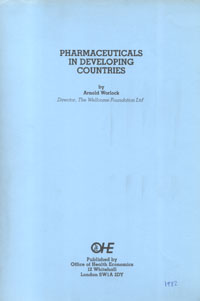The Office of Health Economics has recently widened its scope to take a special interest in the health care problems of the Poor World, with particular…
The Office of Health Economics has recently widened its scope to take a special interest in the health care problems of the Poor World, with particular reference to. the role of medicines.
As a contribution to the discussion in this area, OHE is…
The Office of Health Economics has recently widened its scope to take a special interest in the health care problems of the Poor World, with particular reference to. the role of medicines.
As a contribution to the discussion in this area, OHE is publishing this paper, which was delivered by Dr Arnold Warlock of The Wellcome Foundation Ltd at the 11th Assembly of the International Federation of Pharmaceutical Manufacturers’ Associations in Washington in June 1982.
In its Tables, the paper contains important data on the extent of some of the European pharmaceutical companies’ activities in the Developing Countries. It also gives a glimpse of other ways in which the pharmaceutical industry in Europe has contributed to the transfer of technology to the poor nations.
Hence this publication underlines two facts. The first is that the industry has made a significant contribution to employment and to the production of pharmaceuticals in the developing world. The second is that much more detailed analysis of the whole international pharmaceutical industry’s activities in the poor countries is badly needed.
Two decades ago, when the Office of Health Economics was first set up by the Association of the British Pharmaceutical Industry, a similar situation existed in Britain. The activities of the pharmaceutical industry in this country were shrouded in mystery, and this provided great scope for largely ill-informed criticism. This situation has now been corrected by better information and by the elimination of justifiable causes of criticism. The contribution of the pharmaceutical industry to the economy and health of Britain is no longer seriously questioned. It is to be ·hoped that the publication of progressively more solid data on the activities of the industry in the Poor World, together with improvements in its standards of marketing practice, will soon reveal the nature of its benefits there too.
